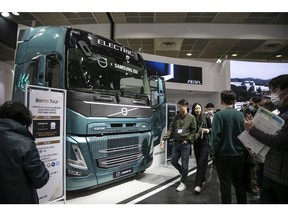Article content
(Bloomberg) — Purely battery-powered trucks have a head start on hydrogen fuel cells in the race to decarbonize trucks, but because of major drawbacks for both technologies, the competition is far from settled.
Battery-powered big rigs have a head start, but don’t count out hydrogen trucks yet.

(Bloomberg) — Purely battery-powered trucks have a head start on hydrogen fuel cells in the race to decarbonize trucks, but because of major drawbacks for both technologies, the competition is far from settled.
Story continues below
While hydrogen trucks offer long driving range and quick refueling, only a few very expensive models are on the market. Battery-electric rigs are relatively cheaper and more widely available, but operating them at scale will require massive investments in high-powered charging infrastructure. Juicing up 1,100 trucks at the same time for 45 minutes would use the capacity of an entire nuclear power plant, according to Martin Lundstedt, the CEO of Swedish manufacturer Volvo.
“And 1,100 trucks is nothing,” Lundstedt said in an interview. “We are talking about professional equipment to be used around the clock. It’s not like with a car that is only used 2% to 3% of the available time during the day.”
Decarbonizing road logistics is one of the biggest challenges facing governments and companies looking to contain global warming. Carbon-dioxide emissions from trucks and buses have soared 80% over the last two decades, and the vehicles heavily contribute to toxic particulate pollution in urban areas. For the industry to limit temperature increases to no more than 1.5°C, two-thirds of trucks sold this decade must be zero-emission, according to a World Economic Forum report.
Story continues below
Battery-electric trucks are already making an impact on the road, with Volvo, Daimler Truck and Volkswagen’s Traton offering different-size models to logistics clients. DHL has put several of Volvo’s e-trucks to work on London streets. Germany’s DB Schenker in January ordered 100 electric trucks from Traton’s MAN brand and has an agreement with Sweden’s Volta Trucks for some 1,500 e-rigs. Danish shipping company Maersk last year ordered 300 vehicles from Swedish startup Einride for its US warehousing, distribution and transportation business.
The modest success of electric trucks — just 0.1% heavy-duty trucks sold in Europe in 2021 were zero-emission — is partly due to their availability. Around 12 times more battery-electric truck models will be available this decade than fuel cell trucks, according to BloombergNEF estimates. Proponents say charging times of an hour or two will come down to around 45 minutes by mid-decade, and that e-rigs will benefit from cheap excess renewable energy.
Story continues below
Daimler Truck, Traton and Volvo have teamed up to address the lack of infrastructure and plan to install and operate at least 1,700 charging points for heavy-duty trucks in Europe, with a planned total investment of €500 million ($551 million). Still, battery costs will have to fall further to make the economics of trucks operating in long-haul routes competitive, according to BNEF, which sees battery trucks reaching cost parity with diesel around 2030, and fuel cell vehicles somewhat later.
“For our customers, it’s really about the lowest possible cost,” said Kenny Kristensen, a manager for Maersk’s land transportation decarbonization program. “Any energy transition in history has always been that the lowest cost wins.”
Story continues below
But don’t count out fuel cell trucks just yet. Their drivetrains convert hydrogen into electricity that then powers the motor, emitting only water vapor. A fuel cell powertrain weighs less, allowing the vehicles to drive longer distances with greater loads and shorter refueling stops.
While Volvo has six battery-electric trucks on offer and sold more than 4,300 of these vehicles since 2019, it’s also pursuing fuel cells. The company last year started testing hydrogen trucks with 1,000 kilometers (621 miles) of range that can be refueled in 15 minutes. Daimler Truck has done similar trials the last few years.
“I’m confident that we’ll see the technology mature over this decade,” Lundstedt said. “Many different players are beginning to realize that electrification and hydrogen are just two sides of the same coin.”
—With assistance from Monica Raymunt.
Comments
Postmedia is committed to maintaining a lively but civil forum for discussion and encourage all readers to share their views on our articles. Comments may take up to an hour for moderation before appearing on the site. We ask you to keep your comments relevant and respectful. We have enabled email notifications—you will now receive an email if you receive a reply to your comment, there is an update to a comment thread you follow or if a user you follow comments. Visit our Community Guidelines for more information and details on how to adjust your email settings.
Join the Conversation